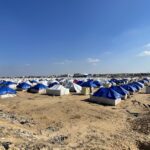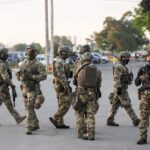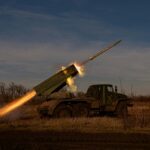In late April, a US airstrike hit a Houthi-run migrant detention facility in Saada, northern Yemen, killing at least 44 people and injuring over 100 others. Most of the victims were Ethiopian migrants who had been detained in overcrowded, poorly ventilated cells. A new Amnesty International investigation, based on survivor testimony, satellite imagery, and forensic analysis, concluded that the strike lacked justification under international law and may have constituted a war crime.
The strike took place as the Houthis and Israel traded tit-for-tat attacks, with the former acting in solidarity with Palestinians in the war-ravaged Gaza Strip. Survivors described scenes of horror: bodies torn apart, walls collapsing, and people buried under rubble. One migrant recounted how he had been thrown across the room by the blast and awoke to find blood and debris everywhere. Another described pulling injured friends from the wreckage while others screamed for help. Many of the dead were never formally identified, and families were left without answers.
Hagos, a 20-year-old survivor and former detainee, said some “regained consciousness in the hospital three to four days after the attack and we started asking about who was dead and who remained alive and where the others were. I saw the video where they [the rescuers] dug and pulled me out from under the debris… I lost my leg, and others have lost their limbs.”
The report emphasized that the detention center was a known civilian site with no evidence of military activity. Amnesty found no indication that the facility was being used for military purposes or that any armed personnel were present at the time of the strike. The organization called on the US government to disclose its targeting rationale and to explain why this location was selected.
Amnesty also criticized the lack of accountability and transparency surrounding the strike. Despite the scale of the casualties, the US had not publicly acknowledged the incident or offered compensation to victims and their families. The report urged Washington to conduct an independent investigation and to cooperate with international bodies to ensure justice for those affected.
The Saada strike occurred amid a broader pattern of airstrikes in Yemen, many of which have targeted civilian infrastructure. Amnesty also noted that the US had provided intelligence, logistical support, and weapons to the Saudi-led coalition, which has conducted thousands of airstrikes in Yemen since 2015. While the coalition claimed to target Houthi military assets, numerous strikes have hit schools, hospitals, markets, and homes.
In this case, however, Amnesty concluded that the strike was directly carried out by US forces, not merely supported or facilitated. The report cited flight path data and weapon fragments consistent with American munitions. It also highlighted the strategic importance of Saada to the Houthi movement, suggesting that the strike may have been part of a broader campaign to pressure the group.
The report placed the incident within the context of Yemen’s humanitarian crisis. The country has endured years of conflict, economic collapse, and widespread displacement. Migrants, particularly from Ethiopia and the Horn of Africa, often pass through Yemen en route to Gulf states, only to be detained, abused, or caught in the crossfire. Amnesty described the Saada facility as overcrowded and unsanitary, with detainees held for months without legal process.
Amnesty’s findings prompted renewed calls from human rights groups and legal experts for greater oversight of US military operations abroad. Critics argued that the strike reflected a dangerous lack of accountability and a disregard for civilian life. They also warned that such actions undermined US credibility and fueled anti-American sentiment in conflict zones.
The report concluded with a series of recommendations. Amnesty called on the US to publicly acknowledge the strike, release all relevant targeting data, and provide reparations to survivors and victims’ families. It also urged Congress to strengthen oversight of military operations and to ensure compliance with international humanitarian law. Finally, the organization demanded that the US support independent investigations and cooperate with international mechanisms to prevent future violations.
The Saada airstrike, according to the human rights watchdog, was not just a tragedy — it was a preventable atrocity that demanded accountability, transparency, and justice.
“The US must conduct a prompt, thorough, independent, impartial, and transparent investigation into the air strike and into any other air strikes that have resulted in civilian casualties and where the rules of international humanitarian law may have been violated in Yemen,” Amnesty said.
Top photo: Protests in Sanaa, Yemen, following missile strikes on the country in January 2024 (Abna24/Wikimedia Commons)




















